Campus/People
-
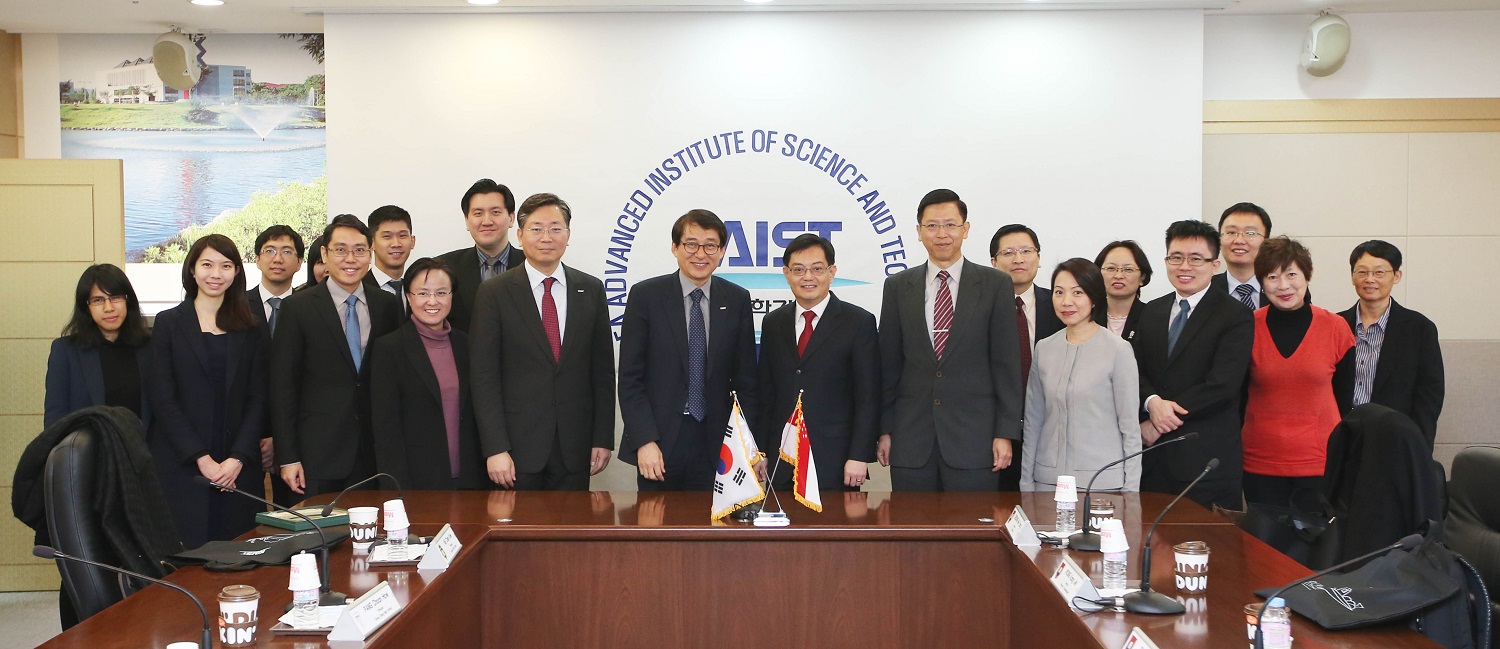 Singaporean Minister for Education Visits KAIST
Heng Swee Keat, the Minister for Education of Singapore, and his delegation visited KAIST on January 26, 2015, to discuss innovative education models being implemented by KAIST and future cooperation with Singaporean universities.
The visit included 21 key personnel responsible for higher and gifted educational programs in the Singaporean government.
Minister Heng showed great interest in KASIT's learner-focused teaching method, "Education 3.0," and graduate school-centered education. He said, "Singapore is in the process of making innovations in university education, for example, by offering more opportunities for global education such as joint programs with leading universities like MIT and Yale University in the US."
In the picture, Vice President for Planning and Budget Seung Bin Park (sixth from the left), KAIST, and Minister Heng Swee Keat (right next to Park) posed together.
2015.01.28 View 6470
Singaporean Minister for Education Visits KAIST
Heng Swee Keat, the Minister for Education of Singapore, and his delegation visited KAIST on January 26, 2015, to discuss innovative education models being implemented by KAIST and future cooperation with Singaporean universities.
The visit included 21 key personnel responsible for higher and gifted educational programs in the Singaporean government.
Minister Heng showed great interest in KASIT's learner-focused teaching method, "Education 3.0," and graduate school-centered education. He said, "Singapore is in the process of making innovations in university education, for example, by offering more opportunities for global education such as joint programs with leading universities like MIT and Yale University in the US."
In the picture, Vice President for Planning and Budget Seung Bin Park (sixth from the left), KAIST, and Minister Heng Swee Keat (right next to Park) posed together.
2015.01.28 View 6470 -
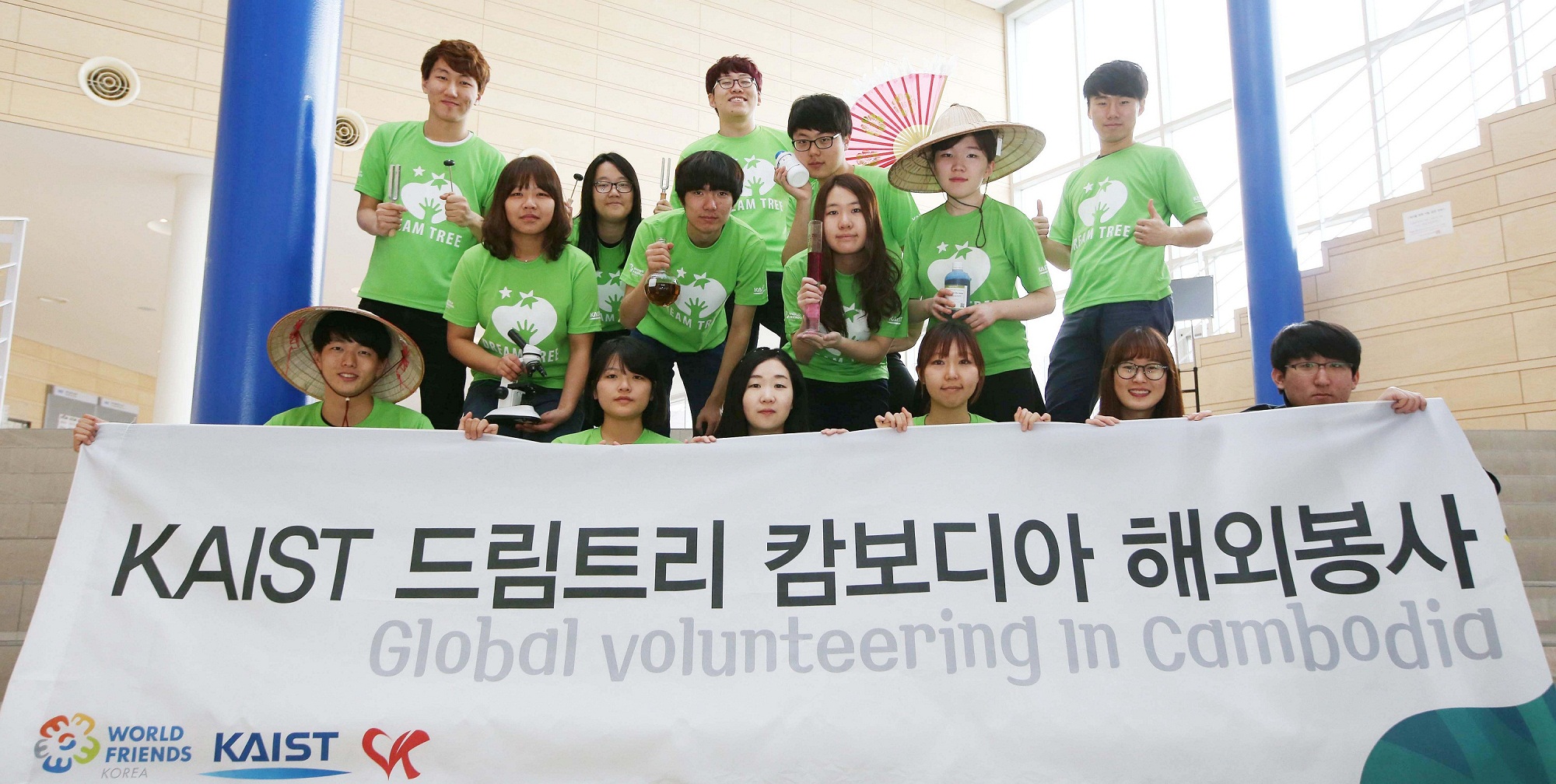 KAIST Students Volunteer in Cambodia
To provide science education for Cambodian high school students and to share Korean art and culture.
Cambodia was one of the 60 nations that joined the United Nations’ efforts to help South Korea during the Korean War in the 1950s. Now, a group of KAIST students starts a journey to return what that nation gave to Koreans so generously over six decades ago.
Initiated and planned by students, the volunteering project “KAIST Dream Tree Global Volunteering in Cambodia” offers science and math education to high school students in Cambodia for 11 days. The volunteer team is consisted of 15 undergraduate students and one faculty advisor, and they will work at Hosanna High School in Phnom Penh, Cambodia from January 24 to February 3, 2015.
With around 150 student participants from Hosanna High School, KAIST students will teach math, physics, chemistry, and biology. They will also provide an opportunity to learn about Korean art and culture, including Taekwondo, a Korean traditional martial art, mural painting, and Korean language.
As K-Pop (Korean pop music) and Korean movies and television dramas have become popular in Cambodia, KAIST students will perform musicals and host a singing contest together with Cambodian students for fun and enjoyment. In addition, students from both countries plan to create flower beds around the high school campus.
Prior to the KAIST team’s departure to Cambodia, the university held a small ceremony to support the students’ volunteer work. Attending the ceremony with other senior faculty members, President Steve Kang thanked the students. He said, “KAIST students have been receiving tremendous support from Korean citizens, and it’s great to see how our students are repaying their generosity by helping young people who are less privileged. I’m really proud of our students and hope that this tradition of sharing science knowledge and passion for science with the global community continues.”
The ceremony took place on January 19, 2015 at the Guesthouse on campus.
2015.01.27 View 7255
KAIST Students Volunteer in Cambodia
To provide science education for Cambodian high school students and to share Korean art and culture.
Cambodia was one of the 60 nations that joined the United Nations’ efforts to help South Korea during the Korean War in the 1950s. Now, a group of KAIST students starts a journey to return what that nation gave to Koreans so generously over six decades ago.
Initiated and planned by students, the volunteering project “KAIST Dream Tree Global Volunteering in Cambodia” offers science and math education to high school students in Cambodia for 11 days. The volunteer team is consisted of 15 undergraduate students and one faculty advisor, and they will work at Hosanna High School in Phnom Penh, Cambodia from January 24 to February 3, 2015.
With around 150 student participants from Hosanna High School, KAIST students will teach math, physics, chemistry, and biology. They will also provide an opportunity to learn about Korean art and culture, including Taekwondo, a Korean traditional martial art, mural painting, and Korean language.
As K-Pop (Korean pop music) and Korean movies and television dramas have become popular in Cambodia, KAIST students will perform musicals and host a singing contest together with Cambodian students for fun and enjoyment. In addition, students from both countries plan to create flower beds around the high school campus.
Prior to the KAIST team’s departure to Cambodia, the university held a small ceremony to support the students’ volunteer work. Attending the ceremony with other senior faculty members, President Steve Kang thanked the students. He said, “KAIST students have been receiving tremendous support from Korean citizens, and it’s great to see how our students are repaying their generosity by helping young people who are less privileged. I’m really proud of our students and hope that this tradition of sharing science knowledge and passion for science with the global community continues.”
The ceremony took place on January 19, 2015 at the Guesthouse on campus.
2015.01.27 View 7255 -
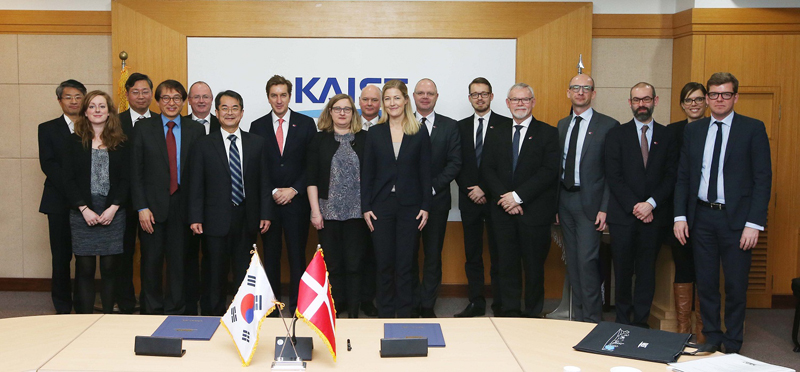 Danish Minister for Higher Education and Science Visits KAIST
Sofie Carsten Nielsen, the Minister for Higher Education and Science of Denmark, accompanied by her delegation, visited KAIST on January 21, 2015 to study outstanding cases of creative economy and to discuss methods of cooperation.
Her delegation included other distinguished members including Thomas Lehmann, the Danish ambassador to Korea, Peter Olesen, Chairman of Innovation Foundation Denmark Governing Board, and Martin Bendsøe, Senior Vice President and Dean of Technical University of Denmark.
After attending the "Electronic Communication Double Degree Agreement" signing ceremony between KAIST’s Department of Electrical Engineering and the Technical University of Denmark, Minister Nielsen visited KAIST’s Institute of Entrepreneurship to observe bilateral industry-university collaborations between KAIST and Denmark and discussed future development plans.
Also, the Grundfos Student Innovation Camp, sponsored by Grundfos, the world's largest pump manufacturer based in Denmark, took place at KAIST from October 26-31, 2014 where Grundfos professionals as well as students from Seoul National University, KAIST, and Technical University of Denmark (DTU) exchanged ideas and opinions on energy efficiency.
KAIST is currently conducting 19 collaborative projects including seven joint researches and seven joint degrees with DTU.
Minister Sofie Carsten Nielsen stands fifth from the left in the front row in the first picture below.
2015.01.27 View 10060
Danish Minister for Higher Education and Science Visits KAIST
Sofie Carsten Nielsen, the Minister for Higher Education and Science of Denmark, accompanied by her delegation, visited KAIST on January 21, 2015 to study outstanding cases of creative economy and to discuss methods of cooperation.
Her delegation included other distinguished members including Thomas Lehmann, the Danish ambassador to Korea, Peter Olesen, Chairman of Innovation Foundation Denmark Governing Board, and Martin Bendsøe, Senior Vice President and Dean of Technical University of Denmark.
After attending the "Electronic Communication Double Degree Agreement" signing ceremony between KAIST’s Department of Electrical Engineering and the Technical University of Denmark, Minister Nielsen visited KAIST’s Institute of Entrepreneurship to observe bilateral industry-university collaborations between KAIST and Denmark and discussed future development plans.
Also, the Grundfos Student Innovation Camp, sponsored by Grundfos, the world's largest pump manufacturer based in Denmark, took place at KAIST from October 26-31, 2014 where Grundfos professionals as well as students from Seoul National University, KAIST, and Technical University of Denmark (DTU) exchanged ideas and opinions on energy efficiency.
KAIST is currently conducting 19 collaborative projects including seven joint researches and seven joint degrees with DTU.
Minister Sofie Carsten Nielsen stands fifth from the left in the front row in the first picture below.
2015.01.27 View 10060 -
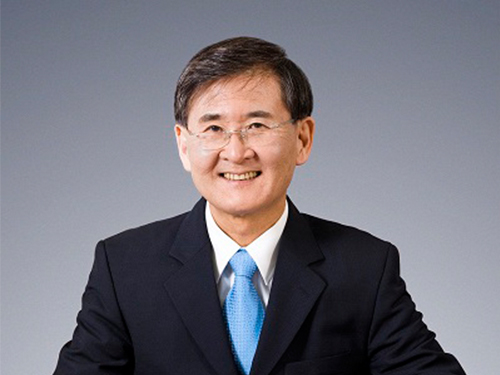 President Kang to Present at the World Economic Forum
President Sung-Mo Kang of KAIST will attend the World Economic Forum (WEF) as a member of the Global University Leaders Forum (GULF) to represent KAIST. GULF is attended by the world leaders of education and research. Its members represent 26 universities drawn from around the world including Harvard University. KAIST is the only Korean university to be invited.
WEF will be held in Davos, Switzerland, for four days, starting on 21 January 2015. He will discuss the future of higher education, the issues and solutions of science and society at GULF.
By attending GULF, KAIST expects to strengthen its network with top universities around the world and raise KAIST’s profile on an international basis. President Kang said, “The invitation for KAIST to attend the GULF is an evidence of its raised global status.” He continued, “I will show the innovative and challenging achievements KAIST has made to the leaders of the world.”
The theme of the 2015 World Economic Forum Annual Meeting 2015 is “The New Global Context” to discuss the integration of economic growth and society, employment and work force, environment and resource scarcity, the future of the Internet, and international crime and anti-corruption.
The World Economic Forum was established in 1971 by Klaus Schwab who is also its Executive Chairman. More than 2,500 people including German Chancellor Angela Merkel, French President François Hollande, Chinese Premier Li Keqiang, Google President Eric Schmidt, and Microsoft CEO Satya Nadella will attend this year's forum.
2015.01.22 View 9126
President Kang to Present at the World Economic Forum
President Sung-Mo Kang of KAIST will attend the World Economic Forum (WEF) as a member of the Global University Leaders Forum (GULF) to represent KAIST. GULF is attended by the world leaders of education and research. Its members represent 26 universities drawn from around the world including Harvard University. KAIST is the only Korean university to be invited.
WEF will be held in Davos, Switzerland, for four days, starting on 21 January 2015. He will discuss the future of higher education, the issues and solutions of science and society at GULF.
By attending GULF, KAIST expects to strengthen its network with top universities around the world and raise KAIST’s profile on an international basis. President Kang said, “The invitation for KAIST to attend the GULF is an evidence of its raised global status.” He continued, “I will show the innovative and challenging achievements KAIST has made to the leaders of the world.”
The theme of the 2015 World Economic Forum Annual Meeting 2015 is “The New Global Context” to discuss the integration of economic growth and society, employment and work force, environment and resource scarcity, the future of the Internet, and international crime and anti-corruption.
The World Economic Forum was established in 1971 by Klaus Schwab who is also its Executive Chairman. More than 2,500 people including German Chancellor Angela Merkel, French President François Hollande, Chinese Premier Li Keqiang, Google President Eric Schmidt, and Microsoft CEO Satya Nadella will attend this year's forum.
2015.01.22 View 9126 -
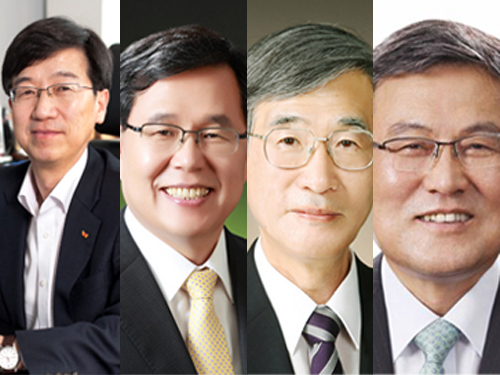 KAIST Announces the Recipients of Distinguished Alumni Awards
The KAIST Alumni Association (KAA) announced four “Proud KAIST Alumni” awards recipients for the year 2014: Sung-Wook Park, the Chief Executive Officer and President of SK Hynix; Seung Ho Shin, the President of Kangwon National University; Kew-Ho Lee, the President of the Korea Research Institute of Chemical Technology; and Mun-Kee Choi, the former Minister of Science, ICT and Future Planning of the Republic of Korea. The award ceremony took place during the 2015 KAA’s New Year's ceremony on January 17, 2015 at the Palace Hotel in Seoul.
Sung-Wook Park (M.S. ’82 and Ph.D. ’88, Department of Materials Science and Engineering), the Chief Executive Officer and President of SK Hynix, has worked as an expert in the field of memory semi-conductors for the past 30 years. He developed innovative technology and improved production efficiency, enabling the Korean semi-conductor industry to become a global leader.
Seung Ho Shin (M.S. ’79 and Ph.D. ’87, Department of Physics), the President of Kangwon National University (KNU), worked in the field of optical information processing, producing excellent research achievements and teaching the next generation of scientists. As the president of KNU, he has set an exemplary leadership in higher education.
Kew-Ho Lee (M.S. ’75, Department of Chemistry), the President of the Korea Research Institute of Chemical Technology, pioneered the field of separation film production which contributed greatly to Korean technological developments. He led several domestic and international societies to facilitate dynamic exchanges between industry and academia and with the international community.
Mun-Kee Choi (M.S. ’76, Department of Industrial and Systems Engineering), the former Minister of Science, ICT and Future Planning, the Republic of Korea, is a great contributor to the information and communications technology in Korea, working as a leader in the field of broadband integrated service digital network. He is also an educator for gifted students in science and technology, and a manager of the Electronics and Telecommunications Research Institute.
The Alumni Association established the “Proud KAIST Alumni Awards” in 1992 to recognize its alumni’s outstanding contributions to Korea and KAIST.
Pictured from left to right, Sung-Wook Park (the Chief Executive Officer and President of SK Hynix), Seung Ho Shin (the President of Kangwon National University), Kew-Ho Lee (the President of the Korea Research Institute of Chemical Technology), and Mun-Kee Choi (the former Minister of Science, ICT and Future Planning)
2015.01.19 View 15709
KAIST Announces the Recipients of Distinguished Alumni Awards
The KAIST Alumni Association (KAA) announced four “Proud KAIST Alumni” awards recipients for the year 2014: Sung-Wook Park, the Chief Executive Officer and President of SK Hynix; Seung Ho Shin, the President of Kangwon National University; Kew-Ho Lee, the President of the Korea Research Institute of Chemical Technology; and Mun-Kee Choi, the former Minister of Science, ICT and Future Planning of the Republic of Korea. The award ceremony took place during the 2015 KAA’s New Year's ceremony on January 17, 2015 at the Palace Hotel in Seoul.
Sung-Wook Park (M.S. ’82 and Ph.D. ’88, Department of Materials Science and Engineering), the Chief Executive Officer and President of SK Hynix, has worked as an expert in the field of memory semi-conductors for the past 30 years. He developed innovative technology and improved production efficiency, enabling the Korean semi-conductor industry to become a global leader.
Seung Ho Shin (M.S. ’79 and Ph.D. ’87, Department of Physics), the President of Kangwon National University (KNU), worked in the field of optical information processing, producing excellent research achievements and teaching the next generation of scientists. As the president of KNU, he has set an exemplary leadership in higher education.
Kew-Ho Lee (M.S. ’75, Department of Chemistry), the President of the Korea Research Institute of Chemical Technology, pioneered the field of separation film production which contributed greatly to Korean technological developments. He led several domestic and international societies to facilitate dynamic exchanges between industry and academia and with the international community.
Mun-Kee Choi (M.S. ’76, Department of Industrial and Systems Engineering), the former Minister of Science, ICT and Future Planning, the Republic of Korea, is a great contributor to the information and communications technology in Korea, working as a leader in the field of broadband integrated service digital network. He is also an educator for gifted students in science and technology, and a manager of the Electronics and Telecommunications Research Institute.
The Alumni Association established the “Proud KAIST Alumni Awards” in 1992 to recognize its alumni’s outstanding contributions to Korea and KAIST.
Pictured from left to right, Sung-Wook Park (the Chief Executive Officer and President of SK Hynix), Seung Ho Shin (the President of Kangwon National University), Kew-Ho Lee (the President of the Korea Research Institute of Chemical Technology), and Mun-Kee Choi (the former Minister of Science, ICT and Future Planning)
2015.01.19 View 15709 -
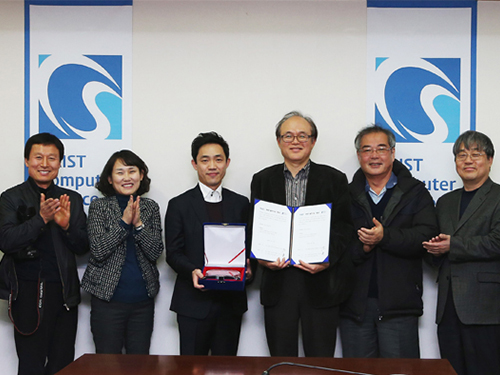 A Doctoral Student of KAIST Donates Scholarship to the University
Sang-Won Seo, a Ph.D. student at the Department of Computer Science at KAIST, recently donated USD 9,300 to the university to support joint degree programs with international universities. He received dual degrees himself for the Bachelor of Science both from KAIST and the Technical University of Berlin in Germany in 2009.
Explaining his reason to donate, Sang-Won said, “I have always felt grateful for the support I received from KAIST during my study abroad. I’m glad to find an opportunity to return to my alma mater what I have received.”
In the picture below, Sang-Won Seo (fourth from the left) and his adviser Professor Seungryoul Maeng (to the right next to Seo) pose together holding the certificate of appreciation on January 14, 2015.
2015.01.16 View 6201
A Doctoral Student of KAIST Donates Scholarship to the University
Sang-Won Seo, a Ph.D. student at the Department of Computer Science at KAIST, recently donated USD 9,300 to the university to support joint degree programs with international universities. He received dual degrees himself for the Bachelor of Science both from KAIST and the Technical University of Berlin in Germany in 2009.
Explaining his reason to donate, Sang-Won said, “I have always felt grateful for the support I received from KAIST during my study abroad. I’m glad to find an opportunity to return to my alma mater what I have received.”
In the picture below, Sang-Won Seo (fourth from the left) and his adviser Professor Seungryoul Maeng (to the right next to Seo) pose together holding the certificate of appreciation on January 14, 2015.
2015.01.16 View 6201 -
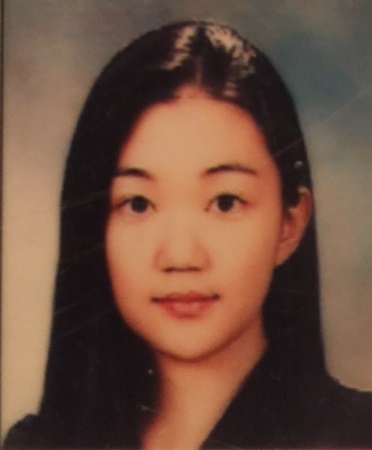 Professor Sunyoung Park Receives an Award from the Minister of Strategy and Finance of Korea
Professor Sunyoung Park, the Department of Industrial and Systems Engineering at KAIST, received an award from the Deputy Prime Minister and the Minister of Strategy and Finance of the Republic of Korea on December 31, 2014 in recognition of her contribution to the Korean economy. Known as an expert in macroeconomics and finance in Korea, Professor Park has conducted research in macroeconomic policies and capital flows.
Recently, Professor Park attended the 18th ASEAN+3 (Korea, Japan, and China) Finance and Central Bank Deputies’ Meeting held in Tokyo, Japan, on December 3-5, 2014 and presented a paper on the economic policies of Asian and G20 nations, receiving positive responses from the participants.
At the award ceremony, she said, “With continuous support from the government and collaborations with regional partners, I hope that my research will help Korea and the Asian economies grow further.”
2015.01.06 View 8136
Professor Sunyoung Park Receives an Award from the Minister of Strategy and Finance of Korea
Professor Sunyoung Park, the Department of Industrial and Systems Engineering at KAIST, received an award from the Deputy Prime Minister and the Minister of Strategy and Finance of the Republic of Korea on December 31, 2014 in recognition of her contribution to the Korean economy. Known as an expert in macroeconomics and finance in Korea, Professor Park has conducted research in macroeconomic policies and capital flows.
Recently, Professor Park attended the 18th ASEAN+3 (Korea, Japan, and China) Finance and Central Bank Deputies’ Meeting held in Tokyo, Japan, on December 3-5, 2014 and presented a paper on the economic policies of Asian and G20 nations, receiving positive responses from the participants.
At the award ceremony, she said, “With continuous support from the government and collaborations with regional partners, I hope that my research will help Korea and the Asian economies grow further.”
2015.01.06 View 8136 -
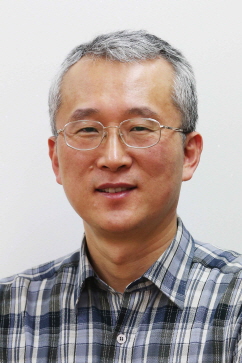 Professor Eunjoon Kim Is KAIST's Person of the Year 2014
KAIST announced that it has named Chair Professor Eunjoon Kim of the Department of Biological Sciences as its “Person of the Year 2014.” The award ceremony took place at the auditorium on campus on January 5, 2014.
Established in 2001, the award has been presented to a KAIST faculty member who has made great achievements in research and education, thereby contributing to the advancement of KAIST.
Professor Kim was the first to identify the mechanism of synapse formation between neurons during his post-doctoral program at Harvard Medical School in 1995. The research was published in Nature.
In 2011, Professor Kim discovered that the lack of protein GIT1, a neuronal synapse in the brain, caused ADHD (Attention Deficit Hyperactivity Disorder). He is widely recognized for his work concerning synapse proteins and brain disease related research that set the foundation for future medical developments.
In his award speech, Professor Kim said, “Whenever a research finding concerning a new drug therapy or research is published, I receive many inquiries from the parents of children with ADHD or autism. As a scientist, I would like to focus my research ultimately to help those in pain, rather than just pursuing research excellence or reputation.”
2015.01.06 View 11031
Professor Eunjoon Kim Is KAIST's Person of the Year 2014
KAIST announced that it has named Chair Professor Eunjoon Kim of the Department of Biological Sciences as its “Person of the Year 2014.” The award ceremony took place at the auditorium on campus on January 5, 2014.
Established in 2001, the award has been presented to a KAIST faculty member who has made great achievements in research and education, thereby contributing to the advancement of KAIST.
Professor Kim was the first to identify the mechanism of synapse formation between neurons during his post-doctoral program at Harvard Medical School in 1995. The research was published in Nature.
In 2011, Professor Kim discovered that the lack of protein GIT1, a neuronal synapse in the brain, caused ADHD (Attention Deficit Hyperactivity Disorder). He is widely recognized for his work concerning synapse proteins and brain disease related research that set the foundation for future medical developments.
In his award speech, Professor Kim said, “Whenever a research finding concerning a new drug therapy or research is published, I receive many inquiries from the parents of children with ADHD or autism. As a scientist, I would like to focus my research ultimately to help those in pain, rather than just pursuing research excellence or reputation.”
2015.01.06 View 11031 -
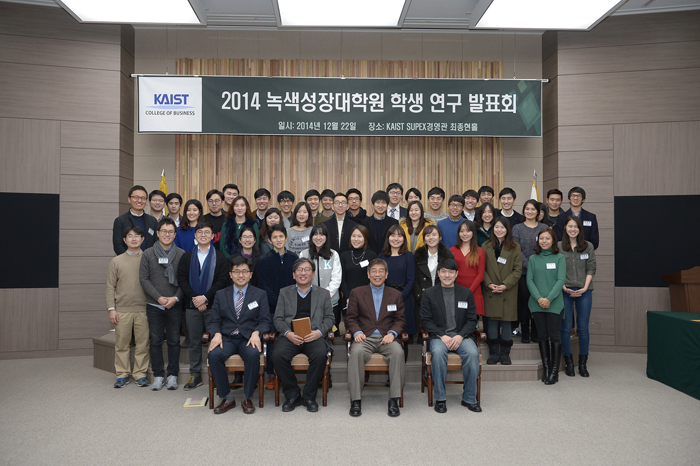 The Graduate School of Green Growth at KAIST Holds a Student Conference
The Graduate School of Green Growth at KAIST hosted a student conference on December 22, 2014 at the Seoul campus of the College of Business. About 100 master’s and doctoral students joined the conference held under the theme of “Green Knowledge Hub” and presented their research papers.
At the conference, three students received awards. The author of a paper entitled “Development and Analysis of Climate Change Vulnerability Index Applicable to Developing Countries” received the grand prize. The authors of “Green IT and Its Case Study on the Reduction of Greenhouse Gas Emissions by Industry” and “Analysis of Correlation between Consumers’ Subjective Happiness and Their Green Purchasing” were selected for runner-up prizes, respectively.
Dean Jae-Kyu Lee of the Green Growth Graduate School said, “We offered the conference to our students to engage with their peers and share ideas and knowledge in their majors. I hope students become more motivated, and we will continue holding this event in the future.”
2015.01.05 View 7268
The Graduate School of Green Growth at KAIST Holds a Student Conference
The Graduate School of Green Growth at KAIST hosted a student conference on December 22, 2014 at the Seoul campus of the College of Business. About 100 master’s and doctoral students joined the conference held under the theme of “Green Knowledge Hub” and presented their research papers.
At the conference, three students received awards. The author of a paper entitled “Development and Analysis of Climate Change Vulnerability Index Applicable to Developing Countries” received the grand prize. The authors of “Green IT and Its Case Study on the Reduction of Greenhouse Gas Emissions by Industry” and “Analysis of Correlation between Consumers’ Subjective Happiness and Their Green Purchasing” were selected for runner-up prizes, respectively.
Dean Jae-Kyu Lee of the Green Growth Graduate School said, “We offered the conference to our students to engage with their peers and share ideas and knowledge in their majors. I hope students become more motivated, and we will continue holding this event in the future.”
2015.01.05 View 7268 -
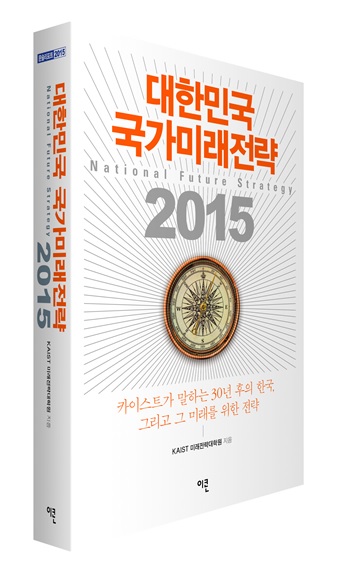 The KAIST Graduate School of Future Strategy Publishes a Book on the Future Strategy for the Development of Korea
As science and technology play an integral role in shaping the future of a nation, a group of scientists at KAIST recently published a book entitled “The National Future Strategy 2015.” The book is available in Korean only.
In the book, the writers propose strategic thinking and plans for Korea to become one of the leading nations on the global stage in the next 30 years. It also suggests a strategic vision for the development of Korea by 2045, the centenary of Korea’s independence from Japan, and recommends specific approaches to address some of the important issues facing Korea: social conflict from the unequal distribution of wealth, low birthrates, an aging population, climate change, the reunification of the Korean peninsula, sustainability, and protection of democracy.
In addition to writings contributed by KAIST professors, the book contains the results of public hearings on major social issues, as well as insights offered by one hundred experts including politicians, government officials, and business representatives.
2014.12.27 View 6290
The KAIST Graduate School of Future Strategy Publishes a Book on the Future Strategy for the Development of Korea
As science and technology play an integral role in shaping the future of a nation, a group of scientists at KAIST recently published a book entitled “The National Future Strategy 2015.” The book is available in Korean only.
In the book, the writers propose strategic thinking and plans for Korea to become one of the leading nations on the global stage in the next 30 years. It also suggests a strategic vision for the development of Korea by 2045, the centenary of Korea’s independence from Japan, and recommends specific approaches to address some of the important issues facing Korea: social conflict from the unequal distribution of wealth, low birthrates, an aging population, climate change, the reunification of the Korean peninsula, sustainability, and protection of democracy.
In addition to writings contributed by KAIST professors, the book contains the results of public hearings on major social issues, as well as insights offered by one hundred experts including politicians, government officials, and business representatives.
2014.12.27 View 6290 -
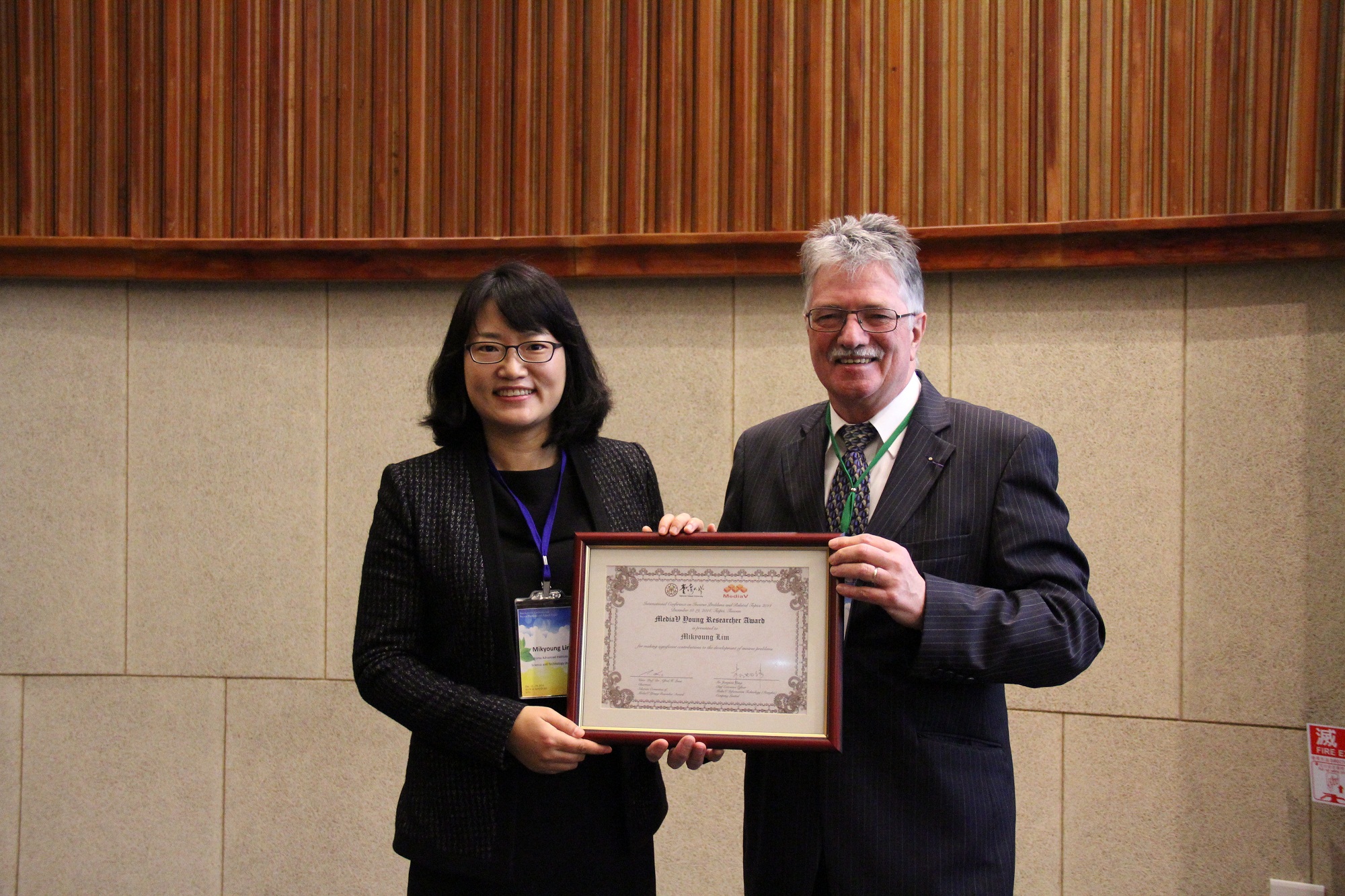 Professor Mikyoung Lim Receives the MediaV Young Researcher Award
Professor Mikyoung Lim of the Department of Mathematical Sciences at KAIST received the MediaV Young Researchers Award at the International Conference on Inverse Problems and Related Topics that took place at the National Taiwan University, Taiwan, on December 15-19, 2014.
The Conference established the MediaV Young Researcher Award in 2010 to recognize distinguished scholars who are age 40 or younger and have made important contributions to the field of inverse problems. This year, two recipients were chosen for the award.
Professor Lim has focused her research on the incremental reading of incomprehensible materials’ imaging and the effect of invisibility cloaking.
The other awardee was Kui Ren, a professor at the University of Texas at Austin.
2014.12.27 View 11792
Professor Mikyoung Lim Receives the MediaV Young Researcher Award
Professor Mikyoung Lim of the Department of Mathematical Sciences at KAIST received the MediaV Young Researchers Award at the International Conference on Inverse Problems and Related Topics that took place at the National Taiwan University, Taiwan, on December 15-19, 2014.
The Conference established the MediaV Young Researcher Award in 2010 to recognize distinguished scholars who are age 40 or younger and have made important contributions to the field of inverse problems. This year, two recipients were chosen for the award.
Professor Lim has focused her research on the incremental reading of incomprehensible materials’ imaging and the effect of invisibility cloaking.
The other awardee was Kui Ren, a professor at the University of Texas at Austin.
2014.12.27 View 11792 -
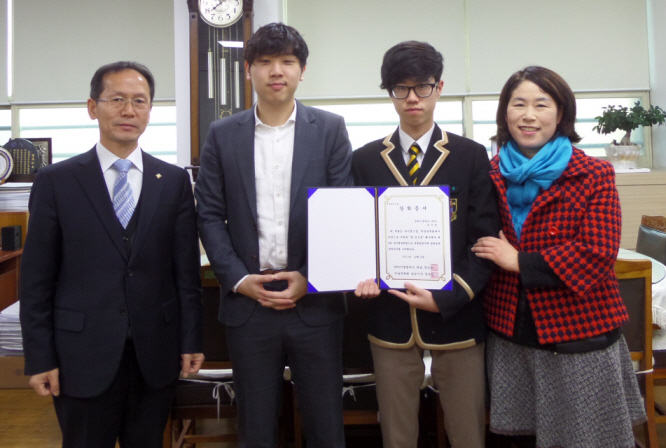 IamCompany and KAIST's Midam Scholarship Contribute Scholarship to High School Students
IamCompany, a venture company established by a KAIST student which provides mobile users with educational applications, and Midam Scholarship, a volunteer group consisting of KAIST students that helps junior and high school students study math and science, selected a total of 118 students and presented them with scholarships.
Among the students, Ki-Bum Kim of Kyung-Hee High School in Seoul received USD 1,300, the largest sum.
In-Mo Chung, the President of IamCompany, who once worked as a member of Midam Scholarship, said, “I joined this scholarship program to support the Midam Scholarhsip which offers educational services to less privileged students. I hope many young students will benefit from this and receive an equal opportunity for better education.”
2014.12.15 View 6821
IamCompany and KAIST's Midam Scholarship Contribute Scholarship to High School Students
IamCompany, a venture company established by a KAIST student which provides mobile users with educational applications, and Midam Scholarship, a volunteer group consisting of KAIST students that helps junior and high school students study math and science, selected a total of 118 students and presented them with scholarships.
Among the students, Ki-Bum Kim of Kyung-Hee High School in Seoul received USD 1,300, the largest sum.
In-Mo Chung, the President of IamCompany, who once worked as a member of Midam Scholarship, said, “I joined this scholarship program to support the Midam Scholarhsip which offers educational services to less privileged students. I hope many young students will benefit from this and receive an equal opportunity for better education.”
2014.12.15 View 6821